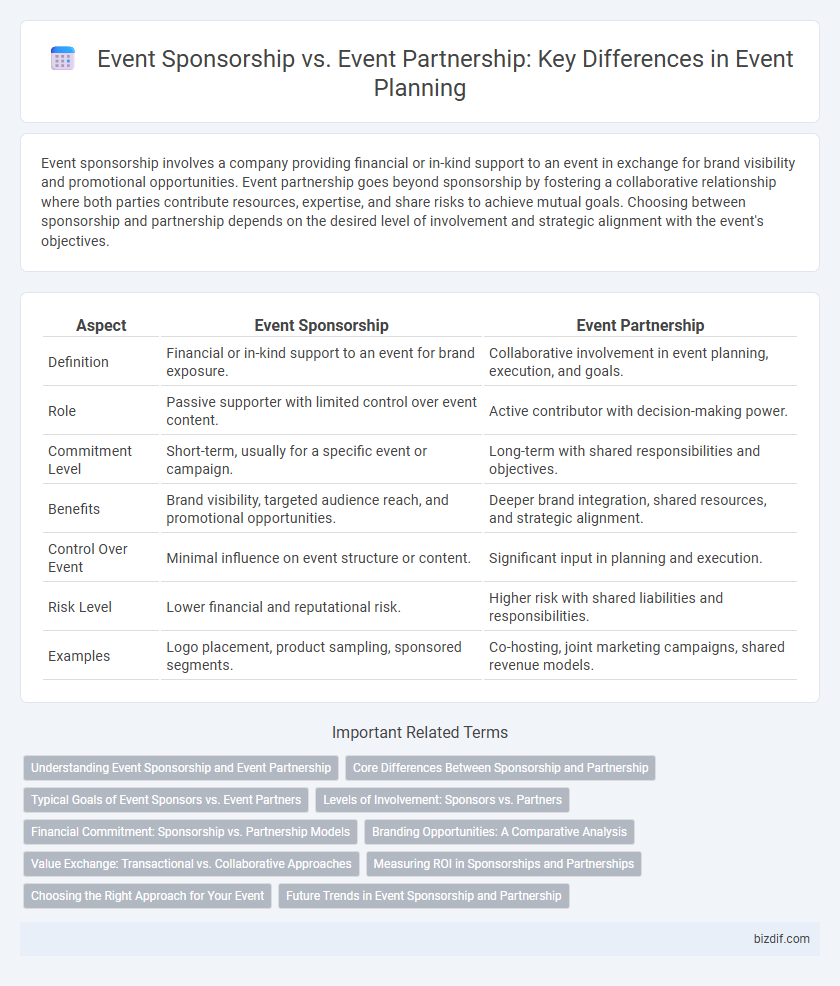Event sponsorship involves a company providing financial or in-kind support to an event in exchange for brand visibility and promotional opportunities. Event partnership goes beyond sponsorship by fostering a collaborative relationship where both parties contribute resources, expertise, and share risks to achieve mutual goals. Choosing between sponsorship and partnership depends on the desired level of involvement and strategic alignment with the event's objectives.
Table of Comparison
| Aspect | Event Sponsorship | Event Partnership |
|---|---|---|
| Definition | Financial or in-kind support to an event for brand exposure. | Collaborative involvement in event planning, execution, and goals. |
| Role | Passive supporter with limited control over event content. | Active contributor with decision-making power. |
| Commitment Level | Short-term, usually for a specific event or campaign. | Long-term with shared responsibilities and objectives. |
| Benefits | Brand visibility, targeted audience reach, and promotional opportunities. | Deeper brand integration, shared resources, and strategic alignment. |
| Control Over Event | Minimal influence on event structure or content. | Significant input in planning and execution. |
| Risk Level | Lower financial and reputational risk. | Higher risk with shared liabilities and responsibilities. |
| Examples | Logo placement, product sampling, sponsored segments. | Co-hosting, joint marketing campaigns, shared revenue models. |
Understanding Event Sponsorship and Event Partnership
Event sponsorship involves a company providing financial support or resources to an event in exchange for brand visibility and promotional opportunities, focusing mainly on marketing benefits. Event partnership is a collaborative relationship where both parties actively contribute to planning, execution, and shared goals, aiming for mutual value and long-term engagement. Understanding the distinction helps organizers align objectives, ensuring sponsorships boost funding while partnerships drive strategic cooperation.
Core Differences Between Sponsorship and Partnership
Event sponsorship typically involves a financial or in-kind contribution from a brand in exchange for promotional opportunities and visibility, focusing more on marketing benefits. Event partnership goes beyond sponsorship by fostering a collaborative relationship where both parties actively contribute resources, share responsibilities, and align goals to create a mutually beneficial outcome. The core difference lies in the depth of engagement and shared objectives, with partnerships emphasizing strategic involvement and long-term collaboration compared to the transactional nature of sponsorships.
Typical Goals of Event Sponsors vs. Event Partners
Event sponsors typically aim to increase brand visibility, generate leads, and achieve direct marketing outcomes by associating their name with the event. Event partners focus on long-term collaboration, co-creating value, and enhancing brand credibility through deeper engagement and shared resources. Sponsors often measure success through immediate ROI and exposure metrics, while partners prioritize strategic alignment and sustained relationship benefits.
Levels of Involvement: Sponsors vs. Partners
Event sponsorship typically involves financial support or in-kind contributions with limited involvement in event execution, focusing primarily on brand visibility and advertising benefits. Event partners engage more deeply, collaborating in planning, decision-making, and operational aspects to align event objectives with mutual goals. Sponsors gain exposure through predefined packages, while partners share responsibilities and risks, creating a more integrated and strategic relationship.
Financial Commitment: Sponsorship vs. Partnership Models
Event sponsorship typically involves a predefined financial commitment in exchange for brand visibility and promotional opportunities, focusing on return on investment through targeted marketing. Event partnerships often require a deeper financial and resource commitment, involving collaborative planning and shared risk to achieve mutual strategic goals. Sponsorships are generally transactional with clear, short-term deliverables, whereas partnerships emphasize long-term engagement and co-creation of value.
Branding Opportunities: A Comparative Analysis
Event sponsorship offers brands high-visibility branding opportunities through logo placement, product sampling, and exclusive naming rights, enhancing immediate audience recognition. Event partnerships provide deeper brand integration via co-creation of event content, shared marketing campaigns, and sustained engagement that fosters long-term brand loyalty. Analyzing brand exposure metrics reveals sponsorship yields broad reach, while partnerships drive meaningful consumer connection and collaborative innovation.
Value Exchange: Transactional vs. Collaborative Approaches
Event sponsorship typically involves a transactional value exchange where sponsors provide funding or resources in return for brand exposure or advertising opportunities. In contrast, event partnerships emphasize collaborative approaches, fostering mutual benefits through shared goals, co-creation, and long-term relationship building. This shift from transactional to collaborative engagement enhances brand authenticity and deepens audience connection.
Measuring ROI in Sponsorships and Partnerships
Measuring ROI in event sponsorships typically involves quantifiable metrics such as brand exposure, lead generation, and direct sales attributed to the sponsorship, enabling clear assessment of financial return. In contrast, event partnerships emphasize long-term value through strategic alignment, audience engagement, and shared resources, which may require qualitative evaluation alongside traditional metrics. Both approaches require tailored analytics tools and KPIs to effectively gauge impact and optimize future event collaborations.
Choosing the Right Approach for Your Event
Selecting the right approach between event sponsorship and event partnership depends on your event's goals and desired level of collaboration. Event sponsorship offers financial support in exchange for brand visibility, ideal for budget-driven campaigns seeking broad exposure. Event partnership involves deeper collaboration, sharing resources and responsibilities, which can enhance credibility and long-term strategic value.
Future Trends in Event Sponsorship and Partnership
Emerging trends in event sponsorship emphasize immersive digital experiences, leveraging augmented reality and AI-driven analytics to maximize audience engagement and ROI. Event partnerships are evolving into long-term strategic alliances that integrate brand values and co-created content, fostering authenticity and deeper community connections. Future event success requires blending sponsorship activation with purpose-driven collaboration, supported by data transparency and sustainability commitments.
Event sponsorship vs Event partnership Infographic

 bizdif.com
bizdif.com